- Home
- Daniel Woodrell
The Outlaw Album: Stories Page 3
The Outlaw Album: Stories Read online
Page 3
I suspect everybody around here and nobody special.
At the opening of each deer season I hope this time she’ll be found. Eleven hunts have come and gone now, and others have been stumbled across in culverts, under old plywood, wrapped carefully in white sheets, and piled over with leaves, but not my girl. This is rough country, though, steep hills, rocky bottoms, hard ground to walk on, gloomy from the trees, and she could be ten feet away as three hunters pass and they’d all miss her. She might lie somewhere else, I guess, under a barn or the freshest patch of concrete in a bachelor’s basement, but that’s not how it comes to me. I can hear wind in the trees and limbs tapping limbs and feel rain.
She disappeared only a quarter mile down our road, taken out of the churchyard where she was mowing the grass, putting a few bucks in her pocket for Saturday night. There are exactly three homes between ours and the church and no strangers in any of them. The lawn mower was still running, blatting and fuming untended beside the tall stone church, until the nearest neighbor noticed the annoying noise no longer moved to and fro and looked from a window. She’d’ve turned seventeen in a month. There’s never been another sign of her.
Sometimes I’ll be at the cash register and catch somebody looking at me in a sort of funny way, at such a slant as to appear sneaky, or with lips curled too high on one end, and think, Is that him? Is he watching me sack groceries and gloating? Does that shifty glance say I fucked your daughter, Henry, from every which angle that felt good to me, then choked the light from her pretty eyes and put her…Should I grab him now while he’s handy and beat on him till he tells me where I can rake her bones together?
At some point every old friend sensed my suspicion aim their way and several couldn’t get over that moment of recognition, even after my suspicion rotated to the next ol’ buddy, or slightly creepy cousin, that mailman with the pencil mustache. There was no blood, no hair strands snatched loose in a fight or torn bits of her blouse, and she was a strong girl, so he had a gun to her head or she trusted him enough to go sit in his truck a minute, hang out, sip a soda. That brings everybody I know into the picture.
Her mother ran west when the girl was five. I was too steady for her taste, too regular, too much the same one day to another. She wanted fizzy drinks and jukeboxes, different arms to hold her every week or two. She remembered her daughter’s birthday for a few years, sent a gift at Christmas, then she just didn’t anymore. She’d turned that page, lit a fresh cigarette, poured a cold one, found new lips to kiss.
I went to all the trouble and tracked her to Reno once our girl was gone, and she said, “Everything with you is a downer, Henry. I just can’t stand your blah-blah-blah negative attitude. You’re so selfish that way. She’ll turn up.”
“She didn’t leave—she was taken.”
“What’s your proof? You got any?”
“You don’t even know her.”
The phone went click, and that was it. She has yet to call with another question.
I always wondered if her mom’s leaving was why the girl ran to fat for so long, had a roly-poly figure until the year before she went gone. She took up swimming, jogging, some flowery-sounding yoga class at the Civic Center, ate salads and more salads and rice cakes. She made herself into a size she hadn’t believed she could ever be. That meant so much to her, to finally have a figure clothes looked good on, to feel a little admired when lolling around the pool in town, wear shorts to the ballpark on summer nights.
I’ve often thought about that: If she’d stayed chunky would she be here now?
Such questions popping up keep the hurt fresh.
And sometimes I think, Were there two of them? Three?
How much of our world is in on this?
Black Step
The cow trembled in the sideways tree, the broken left foreleg canted in a separate direction from the other legs, snapped sharply to the right and dangling. There’d been moans since the storm in the night pushed on and away and the wind calmed. The cow heard my feet rustle pebbles on the cliff, and its tired neck raised the head to look up at me. The cow had wide screaming eyes that were saying things that living things say to me in that language better than words. That language that travels. I’ve seen it everywhere.
The sideways tree was a lonely old sycamore halfway down the cliff that grew straight out from the face for about ten feet, then curled upward for another thirty. Far below, the river flowed clean and dense in the morning shadow cast by the bluff, the rocks in its bed singing of centuries spent singing in the rushing, the things that wash by, bump going past, leave marks or bones. And the cow repeated everything again with those shrill eyes pointed my way, pleading as it had since the forest started rattling and lightning shanks stomped down yellow from the sky and the wind huffed ’til bad instincts took charge and the cow plunged through the barbed wire, seeking a way out of the suddenly terrifying pasture but found only a way down, and the sideways tree snagged it so it had a long hurt night held aloft to hear the rocks far, far below, and know horror.
I felt responsible for the cows.
I turned and walked across the broad sopping pasture toward Ma’s house, tall supple grass flicking droplets to my knees. The sky had been washed baby blue and blank, and the other cows were munching away at the greenery, rubbing their hides on small trees. Ma’s house is a square two-story built plain long ago and still sturdy. It’s painted an invented shade of white about halfway around the house to where the paint ran out, just past the south corner and beyond sight from the road, some certain mix of various whites you have to fetch from town. The rest of the house has been colored with the paler paints left over in the shed, so it’s one color house seen driving by, several others standing in the yard, colors that don’t rhyme in the eye, but the old wood is well coated. A ladder yet leans there, and a couple of brushes on the bottom rung have stiffened atop a paint can lid.
She’s asleep, Ma, snoring in her room, letting the creep of cancer slip her mind a spell, and I go tiptoe through the kitchen to the gun cupboard in the hall. The rifle I want is standing in the back now, behind a cracked oil lantern and a pile of yesteryear phone books, not handy like I kept it. It’s an old bruiser, a bolt-action aught-six that has been whipped on by wintry thickets slapping and raw sporting weather since two grandpas ago, yet it still has a glow to it, a veteran allure. I trust this one most.
The cow screams at me again with those eyes. Screams what you think it would. The sideways tree is too far down the cliff for me to clamber there, even if I was willing. In the valley and downriver a short ways there’s a twist of smoke coming from a new house I keep forgetting is there now. A strange but handsome riverside house made of fresh shining wood, with a steep roof of bluish tile, where outsiders have come to live. I stand on the cliff so a stray round won’t pop into a tile.
This target seemed so close, so easy, so harmless, not like those when I’d been elsewhere.
I said, “Should’ve stopped at the checkpoint, hajji.”
The dead cow slumped more loosely over the sideways tree. The eyes finally hushed. One leg strode hard for a few seconds, trying to climb the cliff now it was shot, climb the cliff in death, then abruptly stilled.
A man came out of the house below and stared at me, a silver-haired man in a black T-shirt, until I flapped a hand his way that meant never mind, it’s okay, and he nodded. He went about his business, stacking firewood in the yard, a dog trailing him, a cat trailing the dog, a woman standing on the porch. Together it all makes one of those pictures of perfect life that might splay across your mind when you are far off and think of home, somebody else’s home, the kind that looks like that and raises your spirits.
In Ward 53, where they fretted about me so, they told me maybe I should paint, take up painting landscapes or portraits, something soothing, but whenever I try the picture explodes on me, the light of day shatters, the humans don’t look too human, and strange patterns span the sky. Sometimes the sky is all cherry blossoms, on
e big blush of pink and white, and there’s bones sticking up from the mud below, with little volunteer vines growing around them, linking them together, like the scattered bones don’t truly belong to death but might hop up reunited by vines and dance a loose clattering jig once more. Hopeful, I guess, deep down, which is why they wanted me to paint.
I have a dozen dead items painted that way.
I know the departed cow in the sideways tree will be next.
Before I went into the desert I’d had a decent job at Spangler Feeds, hefting sacks, stacking salt blocks, sweeping grain dust and such, and they would’ve held it for me, but the whole feed mill burned down to a knee-high mess of ash and nails while I was away, and the Spanglers decided not to rebuild, just not worth it, so they moved to Florida instead and fish for big ones at sea a lot. They sent a postcard. Where Ma worked didn’t help with insurance, so now I watch her cows for her while I can and we’ll contribute the dough to cancer treatment.
Ma’s a Boshell. I’m a Girard, because Ma got to feeling guilty after Dad was gone and had my papers fixed so I was legally his, even if they’d never married. Dad Dad, my sorrowful Dad, was a man given to long blue spells pierced by moments of excited yearning—a handsome doomed man I like more and more as the days roll past and I imagine him with dark curls and thin whiskers and how we resemble.
I carried the rifle with me and marched across the field counting cows. I had got to know them by their color schemes and shapes, and two or three were the kind of cows that had personalities, too, goofy traits or bad tempers that made them stand out among the herd. Only the one had bolted. I walked under the shade trees and around the wallow of red mud and dull water counting twice, then I went to the house to fetch my painting stuff, which they’d been very glad to give me back at Ward 53.
I set the easel above the cow, considered colors I might use, colors that’d catch the feeling of this killed cow, the tragedy of last night that was already nearly forgot, while the cliff and tree and bullet hole’d tell the facts of the story. The color of the actual cow meant nothing now, so I’d fit some to it—colors that suited would come about somehow as my brush moved, and the tree would get rendered the same. I sensed blue for the cow and bronze for the tree and blue again for the killing ground that waited below the tense yellow cliff. The sky grew plum and gray and rippled like a window curtain. As I made the picture, the scene in my head took over and the cliff turned up flat on me, so the plum-gray sky was standing sentry over to the right, and the cow in the sideways tree hung above level ground but below the branch, disobeying gravity now that it’d died.
The bullet hole was a pink question mark.
Ma had walked the pasture counting heads while I was lost deep inside that scene with the cow, and crept along behind me. I was adding chrome boulders to the stream, and when I caught a creeping sound behind I fast as a flinch reached for the rifle, but the rifle wasn’t there, and I sprang for the dirt with one hand shielding my face while the other aimed the paintbrush. The brush swept back and forth, wanting to spray a wide field of fire, a death blossom, get ’em all, and I felt wiggly in my head as a few drops dove loose to dribble down me.
Ma said, “That cow’s money lost now.”
They tell me Dad committed suicide for reasons he dreamed up. His mind was too active. He had a round mind and it roamed. He could imagine any kind of hurt. He could imagine the many miseries of this world flying over from everywhere to roost between his ears, but he couldn’t imagine how to get away. Ma loved him past his end and has never kissed another man. She loved his mind, his round, roaming mind that made her feel a glowing inside her skin between those spells of blight. He waited all of a calm spring night for some fresh serious pain to come into his heart and kill him. Twelve coiled hours hunched at the kitchen table, frozen peas dumped on the tabletop, a shotgun leaning against the back of his chair. He arranged rank after rank of cold green peas, took aim, and flicked each toward the kitchen sink and kept a secret score. Then he gathered the peas from the sink and floor, rearranged them across the tabletop, and flicked them all again. Once the peas were ruined, he switched to flicking corn kernels, raisins, whatever, until the score was lost in his head and the floor slippery. He drank enough coffee his brain shook in its bowl, then drank whiskey to get that shaky brain calm. At some point inside that addled calmness the heavy curtains parted and he thought he spied a good way out, an answer to it all—stepped to the back stoop and sat and erased his problems in this world, maybe not the next. He died gushing blood on the second step of the back stoop, the step we keep painted black.
I don’t truly remember, but Ma has told me about it, made it meaningful to me, saying I followed him onto the stoop, my rusty diaper drooping, and the ejected shell bounced off my belly, and Dad tried to say one last word to me but it drowned in blood that jumped up in his throat, never got said. So now I do sort of recall an ejected shell bouncing from my baby-belly, blood flying, that one last word drowning in red.
He’s buried out back, Buddy Girard, and Ma prays at his grave.
Ma? Ma? She’s not all there; parts have fallen away and dashed, dashed against her days, parts that fell the day she was pulled from school at sixteen and sent to work at the shoe factory, parts that fell the day the shoe factory closed, the day Marcella died in her crib, the day she was told she had cancer, the day Dad died on that one black step. She has always carried on, though, Ma, hefting the parts of herself that remained, dragging them onward, and remaining more decent than she had to be, which makes me try to stay alive for her.
Ma wants to be buried on the farm. She’d been happy here when she was too young to know better and during the first year with Dad. Her grave will be near the rest, but not quite with them, several paces to the west of the others, under the dirt with Buddy. I’ve squared the plot with railroad ties, and we’ve planted perennials along the border, purple phlox and daisies and such that wave spirited colors when a breeze passes. The graves overlook the river and are well shaded in summer until about noon, then the good light reaches and grows things there. A spot has been picked for me, also, to the sundown side, and I’ve found my marker, a reddish river stone with battered edges and a kind of cracked, silent dignity. It’s too big to throw or kick away. The stone will remain unchanged, no name or date, and someday vines and flowers will cover the stone in tangled green and sweetness. Ma wants a regular wooden cross about three feet tall, painted white, same as Dad had before a high wind flung his away.
You have to know where to stand to stand over his grave.
I like graves that disappear.
Mary is the woman who has chosen me to be the man she needs. She has rooted inside my life and claimed me, claimed me to be her man of tomorrow and the days after, claimed me for loving, too, I guess. She lives with her momma four miles away, near where Chime Creek joins the Twin Forks, in a trailer with her kids, two of them, Joe and Nora, neither old enough for school but both already hunkered down into a fretful shyness, a reluctance to be noticed or speak up. Mary likes to visit me after dark, once the bars have got boring, raise dust driving her heavy rattling car into Ma’s yard, and park under the spreading oak, radio music kicking holes through the night quiet.
She grunts getting out of the car, slams the door. Most times she’ll have a movie in her hand, whatever beer is left tucked under her arm. Her moccasins are silent crossing the dirt.
This time, same as always, I greet her with “Mary.”
“Yup. Once again.” She’s taller than she wants to be and rolls her shoulders forward to shorten her neck, drops her chin, sags her upper self like a flower that’s got a blooming too heavy atop for its stem to carry. She holds the movie toward me, shakes the box. “How ’bout a picture show, Darden?”
“Funny?”
“Could be to you.”
Mary wants to kiss, so I do, and she wants some sort of familiar caress, one that suggests we know each other’s bodies like favorite getaway places we’ve come to own, so
I put both hands to her butt and pull the cheeks spread a little bit, lift her. Mary has a small beer pooch underslung from her lower belly, but is elsewhere lean, skinny, even, and I can about feel the bone under her butt with my fingertips. She’s got pale hair and a few freckles that seem to be forever fading from her face but never go away.
In the living room she right away wants me to get naked. Ma’s bed is downstairs so she can be near the john, and she lays snoring in the dining room, just around the corner. The TV is muted but on, throwing a headache light across the room, throbbing between near dark to suddenly glaring, with many skittish flickers between. I know I’m supposed to want this, what she offers, so I try to recall how it goes when this is something you want, crave, gotta have, can’t do without, might kill for, die over, mourn when it’s gone.
Somehow my clothes come off, drop to the floor, first frost stripping a tree of its last clinging leaves.
“Such a tight, smooth boy,” she says. Mary is pushing nine years older, and unlike most women would do she apparently enjoys reminding me I’m way younger. It somehow stokes her needs and juices her good to say it aloud. Whenever she says it she sighs soft and looks like a crouched cat studying songbirds in a low bush. “Lucky ol’ me. Lucky, lucky.”
All Mary does is scoot from her moccasins and jeans and blue undies. She keeps her shirt on and buttoned, the tails hanging over that pooch. Her lips get around on me some, visiting here and there, then I bend her over the couch, knees to the carpet, and slam her the doggy-way she wants it most times. Slap her ass as she has taught me while I slam, slam and slap, and she snickers, snickers, moans into the cushions. Fresh rug burns get added to the old on my knees and I collapse backwards after, stare at the ceiling, count the cobwebs and get the same tally as the visit before.

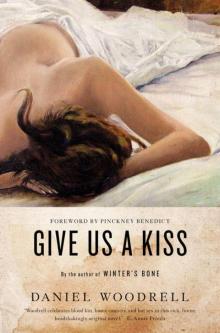 Give Us a Kiss: A Novel
Give Us a Kiss: A Novel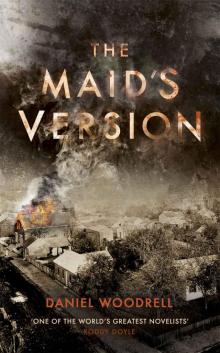 The Maid's Version
The Maid's Version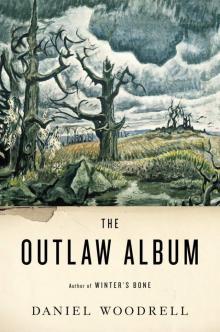 The Outlaw Album: Stories
The Outlaw Album: Stories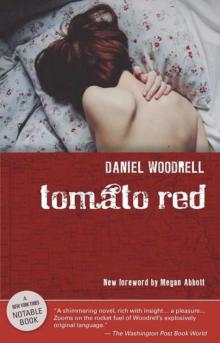 Tomato Red
Tomato Red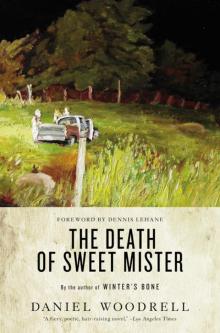 The Death of Sweet Mister
The Death of Sweet Mister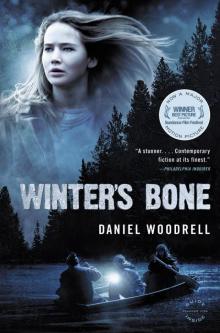 Winter's Bone
Winter's Bone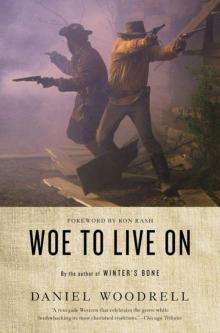 Woe to Live On: A Novel
Woe to Live On: A Novel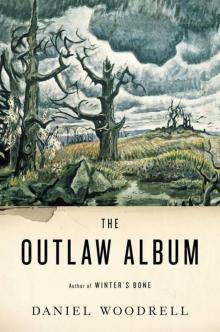 The Outlaw Album
The Outlaw Album